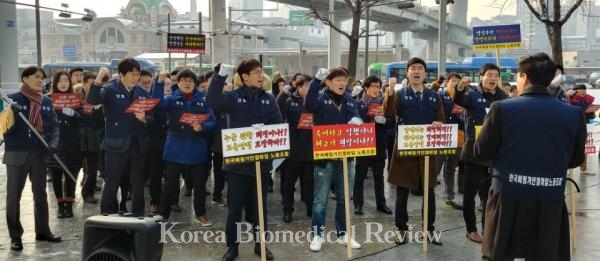Top 10 pharmaceutical stories in 2017 ⑥

Multinational pharmaceutical companies experienced various disputes with their employees this year.
Starting with Baxter, foreign drugmakers, such as Takeda Pharmaceuticals Korea, Zuellig Pharma Korea, and Boehringer Ingelheim Korea, had conflicts with their Korean employees.
Baxter Korea, the Korean offshoot of the U.S.-based pharmaceutical company, allegedly forced its employees to resign, under the disguise of resignation under the pretext of early retirement program in April. According to the Korea Democratic Pharmaceutical Union, Baxter Korea urged seven employees to leave the company. The company allegedly handed out resignation letters in English to these employees, forced them to sign them, and submit their translated versions.
Although the company said the workforce adjustment was neither a voluntary retirement nor a layoff, the union pointed out that the resignation under advice was just a trick. According to the union, in the case of voluntary departure, the company has to pay compensation amounting to the industry’s average by law, which the management would have had to pay as they had no justifiable reasons to dismiss them.
Multinational pharmaceutical companies and their employees also clashed over wage negotiations.
Earlier this year, Takeda Pharmaceutical Korea’s union held a rally, demanding an increase in wages, including improvements in unfair personnel systems and various corruption problems. During that time, the union demanded a wage increase of 13.5 percent, but the company only offered a 4 percent wage increase, and negotiations collapsed.
Employees of Zuellig Pharma Korea also held a rally after the company allegedly changed its words during wage negotiations. Earlier this year, the National Labor Relations Commission (NLRC) recommended that the management of the drugmaker increase the basic annual salary by 3.1 percent and pay 1.5 million won ($1,366) to each worker as a one-time payment for an agreement of the deal. During that time, the management agreed to accept the NLRC recommendation. However, the union said that the company later changed the deal to limit their basic annual salary to 3 percent and pay only 500,000 won as a one-time payment.
Boehringer Ingelheim Korea was also in a dispute with its employees after announcing an early retirement program for some of its employees at the cardiovascular diseases division on Dec. 18. The company’s decision to disintegrate the cardiovascular unit came amid the underperformance of its flagship drugs. To reduce the number of the cardiovascular staff, Boehringer Ingelheim Korea said it would receive requests from 23 applicants in the team to change their roles, and conduct the early retirement program for the other 26 employees in the unit.
However, the labor union demanded that the company receive role-changing requests from all of the employees at the cardiovascular team.

